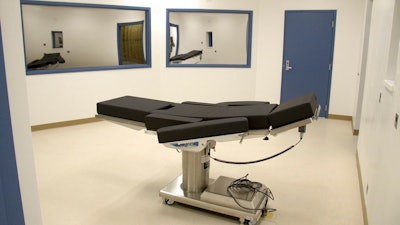
LITTLE ROCK, Ark. (AP) — Arkansas lawmakers sent the governor legislation Wednesday to expand the secrecy surrounding the source of the state's lethal injection drugs, over the objections of media organizations, pharmaceutical companies and death penalty opponents.
The House voted 71-16 to approve a bill prohibiting the release of any information that directly or indirectly would identify the maker or supplier of Arkansas' execution drugs. The Senate-backed measure now heads to Republican Gov. Asa Hutchinson, who plans to sign it into law. The bill makes recklessly disclosing the information a felony punishable by up to six years in prison and up to a $10,000 fine.
Arkansas doesn't have any executions scheduled, and the state's supply of the three lethal injection drugs it uses has expired. Prison officials have said they won't search for any replacements until the secrecy law is expanded to include the drug's manufacturers.
"The passage of this bill is the only way we're ever going to be able to institute the death penalty and carry out the sentence that was handed down by juries," Republican Rep John Maddox said on the floor before the vote.
Arkansas and a dozen other states have enacted laws since 2011 preventing the release of information about the source of their execution drugs, while several other states have invoked existing laws or regulations to keep that information secret. Robert Dunham, the executive director of the Death Penalty Information Center, says Arkansas' proposal would be the most extreme in the country.
"It's a combination of withholding all the information and making it a felony to even unintentionally but recklessly disclose it," said Dunham, whose group has criticized the way states carry out executions. "What also stands out is the level of conscious disregard for the facts and conscious disregard of the potential effects."
Jeff Rosenzweig, an attorney for death row inmates challenging Arkansas' execution protocol, this week called the measure "blatantly unconstitutional." Rosenzweig said that under the measure companies could face criminal penalties if they filed lawsuits challenging how Arkansas obtained the drugs.
The measure is a response to state Supreme Court rulings that the state's current execution secrecy law only keeps the supplier and not the manufacturer under wraps. Hutchinson and Republican Attorney General Leslie Rutledge had both backed the measure.
"The will of the people, the judicial system in Arkansas, will be stymied if you don't have the capacity to acquire those drugs and confidentiality is an important part of that," Hutchinson told reporters before the vote. "It's just a necessary step."
The Arkansas Press Association has opposed the measure, saying it would grant sweeping power to the state to withhold information about executions. It also has drawn objections from two pharmaceutical companies — Hikma Pharmaceuticals and Fresenius Kabi USA — who have said it would hamper their ability to prevent their products from being used in executions. Fresenius said the measure could lead to unintended consequences, including drug shortages because of European Union regulations aimed at preventing the export of drugs used in executions.
Arkansas hasn't carried out an execution since 2017, when it planned to put eight inmates to death over an 11-day period. The state ultimately put four men to death over eight days after half the executions were halted by the courts. The state scheduled the executions before its supply of midazolam, a sedative used in its lethal injection process, expired.
Hutchinson said the bill and another measure he signed addressing a state Supreme Court ruling over how death row inmates are found competent to be executed set the stage for Arkansas to resume executions, but said it's unclear how quickly the state will be able to do so.






















